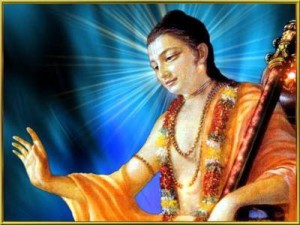A Life of Indulgence
Once upon a time, there lived a wealthy man who was deeply engrossed in sense enjoyment and cared little about spiritual practices. His life was filled with pleasures and material pursuits, leaving no room for thoughts of bhakti or devotion.
Meeting a Sadhu
One day, by some good fortune, he met a sadhu who informed him about the importance of chanting and hearing the Holy Names of the Lord, especially at the final moment of life. The sadhu explained that remembering the Lord’s name at the moment of death could lead to liberation.
A Plan for the Future
Hearing this advice, the rich man thought, “If the whole purpose of life is to remember the Lord’s name in the final moment, why should I do it now? Let me do it when I am about to die.” To ensure that he wouldn’t forget, he instructed his family to chant the Holy Name when he was on his deathbed.
Years of Continued Enjoyment
Satisfied with his plan, the rich man continued with his life of indulgence. However, years later, he suffered a paralytic attack that left him bedridden and unable to speak. Even for his daily needs, he had to use sign language to communicate with his family.
The Final Moments
As he realized that his end was near, he signaled his family to chant the Lord’s names. Some family members did not understand his signals, and those who did understand refused to chant. They were eagerly waiting for him to die so they could inherit his riches and feared that chanting the Holy Names might restore his health, prolonging his life and delaying their inheritance.
Moral of the Story
To remember the Holy Names of the Lord, to chant or hear His names, is not a child’s play. It requires our endeavor throughout life and the mercy of the Lord.
Teachings from Prahlada Maharaj
In Srimad Bhagavatam verse 7.6.1, Prahlada Maharaj instructs his classmates:
“shri-prahraada uvaaca kaumaara aacaret praajno / dharmaan bhaagavataan iha durlabham maanusham janma / tad apy adhruvam arthadam”
“Prahlada Maharaja said: One who is sufficiently intelligent should use the human form of body from the very beginning of life—in other words, from the tender age of childhood—to practice the activities of devotional service, giving up all other engagements. The human body is most rarely achieved, and although temporary like other bodies, it is meaningful because in human life one can perform devotional service. Even a slight amount of sincere devotional service can give one complete perfection.”
The Importance of Early Practice
Our elders led simple, clean Vedic lives right from childhood, which kept them hale, healthy, and active even in old age. They were prepared for the final exam of life.
Conclusion
If we sincerely practice devotional service when we are healthy, the all-merciful Lord makes all arrangements for us to remember, chant, and hear His names in our final moments. However, if we neglect our spiritual duties and do not practice throughout life, we cannot expect to pass the final test. Just as with any important endeavor, consistent and sincere effort is crucial for success.
Prayer
O Lord, grant me the wisdom to remember You always and to chant Your Holy Names with sincere devotion. Guide me in my spiritual practices so that I may live a life of service and love. Please bless me with the strength to persevere in my devotion, and may Your mercy carry me through my final moments, allowing me to remember and glorify You until my last breath.
Hare Krishna Hare Krishna Krishna Krishna Hare Hare
Hare Rama Hare Rama Rama Rama Hare Hare



